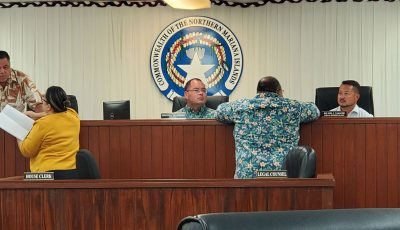House panel adopts key budget provisions
The House of Representatives’ Ways and Means Committee has adopted key provisions of the CNMI budget bill that are primarily intended to benefit education and health in the Commonwealth, including taking a look at possibly implementing a universal health care system here.
Committee member Rep. Tina Sablan (Ind-Saipan) said the panel adopted language that would require the Commonwealth Health Care Corp. to submit a report to the Legislature on a feasibility study of having a universal health insurance model for the CNMI.
“[CHCC would also be required to] present policy options the Legislature might consider to address the longstanding problem of uncompensated care,” she said.
“A substantial percentage of our community is both low-income and uninsured, and CHCC is mandated to provide care to everyone who comes in for treatment, regardless of their ability to pay,” she said. “We all have an interest in expanding health coverage and ensuring that CHCC is adequately compensated for services rendered.”
The House will be holding a special session at 2:45pm tomorrow to discuss and pass the budget bill, House Bill 21-64.
The committee, chaired by Rep. Ivan A. Blanco (R-Saipan), also adopted a recommendation by the minority bloc to appropriate at least $6 million to the Northern Marianas College, with the latest version of the draft bill identifying slightly over that amount of budgetary resources for the CNMI’s lone public community college.
Aside from requiring agencies and departments to submit fund status reports at the end of each quarter, the bill also contains language that redirects the unencumbered balance of the CNMI Office of the Public Auditor’s 1 percent fee at the end of the 2019 fiscal year to CHCC, NMC, the State Public School System, Medical Referral program, and the Settlement Fund.
The agencies and department expenditures, reprogramming activities, and payment of the OPA’s 1 percent fee are included in the status reports. The committee also agreed on language that would allow CHCC, NMC, and PSS to utilize their appropriated funds without fiscal year limitations. Stronger penalties will be levied against department that spend beyond their budget limits.
Another committee recommendation is that expenditure authorities who violate spending limits shall not be entitled to indemnification under the Government Liability Act or reimbursement.
Sablan said the minority bloc also recommended adding FTEs for a specialty courts coordinator and a compliance officer for the drug court program as the Judiciary asked for when they faced the Ways and Means Committee last month.
The minority also recommended that the reprogramming guidelines of the Planning and Budgeting Act be applied; they opposed granting unlimited reprogramming powers to expenditure authorities.
“The latest version of the House budget bill does not provide unlimited reprogramming authority and, in fact, we adopted a new provision, proposed by the majority, that requires the governor [to submit a] 15-day notice to the Legislature prior to exercising any reprogramming authority under the law,” Sablan said.
The minority supported the provisions recommended by the majority on a language that would grant the Legislature’s fiscal analysts access to Finance’s records system. “So that we may independently draw our own data and generate our own financial reports without having to rely on the administration to respond to requests for information,” said Sablan.
This is what Rep. Joel C. Camacho (R-Saipan) had pushed for—that the Legislature provides funding for the Legislative Bureau with the director being the expenditure authority. He said the language that they adopted was to give their fiscal analysts training and access to the JDA software where it would provide better data gathering and obtaining financial information since the Legislature appropriates the money.
Aside from Sablan, the other minority member on the committee is Rep. Donald M. Manglona (Ind-Rota).



























